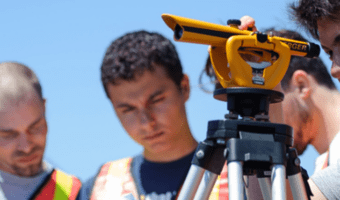Program Overview
Mechanical Engineering Technology degrees build on the knowledge gained at the associate level. Our bachelor’s degree in Mechanical Engineering Technology (MCT BS) will teach you how to form links between the design aspect of product development to the production phase and facilitate delivery to the customer.
Students will complete a capstone project and prepare for opportunities as a technologist in production, quality, processes, automation, and tooling. Make the most of a learning environment and various course options designed to bring the best out of all students.
Read MoreFull Description
Manufacturing in the United States started in New England, where it became the cornerstone of the economy. Today, New England has many new small manufacturing companies creating a job market for today’s engineers and designers. A location like this ensures that NEIT students don’t have to search too far and long to start their careers.
The Bachelor of Science in Mechanical Engineering Technology focuses on product and process design. The courses focus on today’s job market requirements and skills that include product design, computer-aided design, tool and machine design, and manufacturing methods. The degree also supports engineering professions such as development and application engineers, CAD engineering specialties, and basic engineering problem-solving.
The courses in the program complement and augment the courses completed at the associate level. The bachelor of science level courses allows students to create links between product development and the production phase and facilitate delivery.
Students learn the theory and application of hydraulics, pneumatics, dynamics, instrumentation, thermodynamics and heat transfer, and machine design. Additionally, students gain knowledge in mechatronics, materials and inventory control, and plastics design.
Near the end of the program, students complete a capstone course — an excellent opportunity to tie the coursework together into a comprehensive senior project. The capstone project ensures that each student has met the industry standards.
The search for employment opportunities in research and development, design, and manufacturing professions is made easier by ensuring students meet industry standards before the end of their courses.
The opportunities for design professionals are diverse. They contribute toward virtually every conceivable type of manufactured product. These even include less obvious process-intensive product types such as clothing and foodstuffs.
Product design courses offer exceptional opportunities for creative individuals in machine design, specialized or customized product manufacturing, packing or container design, and toy design.
This program is ideal for graduates of the New England Institute of Technology Associate in Science in Mechanical Engineering Technology degree program. Graduates of other colleges with related degrees in engineering technology may be eligible for transfer into the program’s junior year.
Students may also be eligible for advanced standing through transfer, in some cases, related work experience. Upon completing this program, people may also choose to continue into the NEIT Master of Science in Engineering Management degree program instead of shifting to other colleges.
ACCREDITATION STATUS

The Bachelor of Science Degree program in Mechanical Engineering Technology is accredited by the Engineering Technology Accreditation Commission (ETAC) of ABET, http://www.abet.org.
Potential Career Opportunities
Degree programs in Mechanical Engineering Technology open up several exciting positions for students. Graduates can find work as a:
Machine Designer
Tool Designer
3D Printing Engineer
Manufacturing Engineer
Project Engineer
Engineering Technician
Applications Engineer
Engineering Associate
Mechanical Engineer
CAD Mechanical Designer
Production Management
Process Engineer
Automation Engineer
Production Engineer
FAQ
-
What is the difference between a Bachelor of Science in Mechanical Engineering and a Bachelor of Science in Mechanical Engineering Technology?
Unlike traditional engineering courses, a mechanical engineering technology program offers engineering students opportunities for a more hands-on educational experience.
Mechanical engineering technology students focus less on math and more on applying the concepts they learn in class. While a mechanical engineer’s skills are very design and theory-oriented, a mechanical engineering technologist’s skills are used to put ideas into action.
For example, a mechanical engineer may design consumer products based on engineering principles. A mechanical engineering technologist will then analyze this design’s practical application and provide feedback. For major projects, they may monitor the machines for quality control and adjust the manufacturing systems as needed.
-
Is a degree in Mechanical Engineering Technology worth it?
Upon completing their program, mechanical engineering technologists will understand the key concepts in computer-aided design, tool design, quality control, project management, and ethical systems implementation.
Your newly acquired skill set allows you to pursue careers that require a liaison between manufacturing and engineering teams. You can also work as the machine design and testing partner to an engineer.
The Bureau of Labor Statistics (BLS) provides current statistics on potential salaries and job outlook. Careers in the mechanical engineering technology stream offer graduates the opportunity to see their work’s positive outcomes while pursuing a rewarding career.
-
What kind of jobs can you get with a Mechanical Engineering Technology degree?
A bachelor’s degree in Mechanical Engineering Technology prepares students for roles like:
- Engineering Technician
- Applications Engineer
- Engineering Associate
- CAD Mechanical Designer
- Production Management
- Process Engineer
- Automation Engineer
- Production Engineer
- Systems Engineer
-
Can a mechanical engineer technologist become a mechanical engineer?
Although the training is different, a mechanical engineering technology student may also pursue work as an engineer. Both careers require a thorough understanding of computer-aided design, problem-solving approach, manufacturing systems, and consumer products.
If you’re interested in designing machines or systems, a mechanical engineering degree might be worth it. Graduates will enjoy implementing plans and seeing ideas come to life.
-
Does NEIT provide financial aid?
The federal government recognizes the accreditation by the New England Commission of Higher Education(NECHE) and entitles NEIT to participate in federal financial aid programs. To be eligible for the maximum financial aid award, you need to maintain at least 12 credits per academic term.



